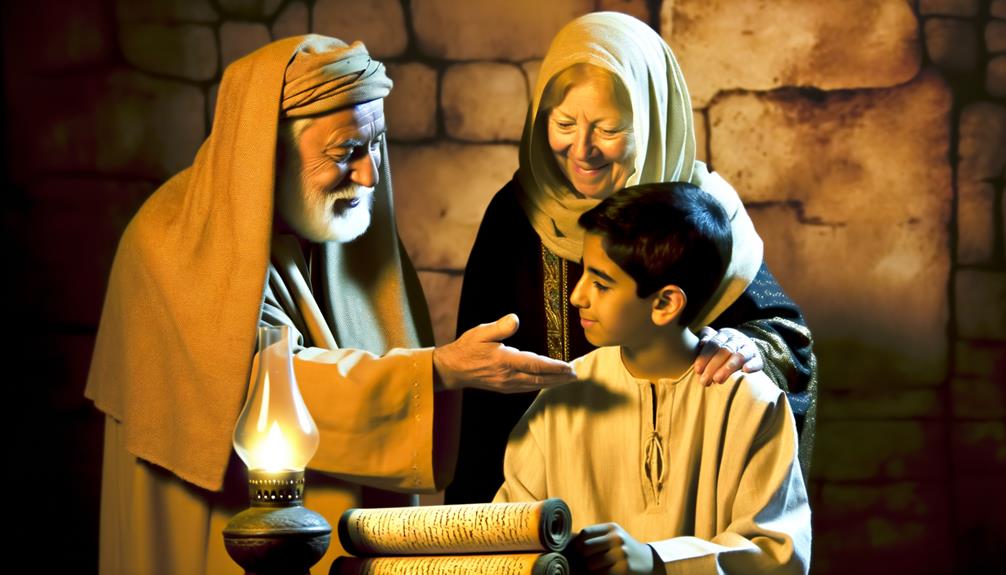Eunice in the Bible Meaning: Faithful Mother and Legacy
Eunice, mentioned in the New Covenant, prominently in 2 Timothy 1:5, is celebrated as the mother of Timothy and is commended by Apostle Paul for her genuine faith. A Jewish woman married to a Greek man, Eunice played a pivotal role in Timothy’s spiritual upbringing, blending Jewish traditions with early Christian teachings.
Her commitment to instilling the Holy Scriptures from infancy (2 Timothy 3:15) greatly influenced Timothy’s ministry. Eunice exemplifies the profound impact of maternal faith and dedication in nurturing spiritual resilience and shaping future Christian leaders.
To uncover more about her enduring legacy, continue exploring her story.

Eunice in the Bible Meaning: Faithful Mother and Spiritual Legacy
| Aspect | Biblical Insight |
|---|---|
| Name Meaning | Eunice means good victory or victorious |
| Biblical Reference | 2 Timothy 1:5 – Paul praises her sincere faith |
| Role | Mother of Timothy, raised him in the Jewish faith alongside his grandmother Lois |
| Spiritual Significance | Symbol of generational faith and godly parenting |
| Character Traits | Faithful, nurturing, spiritually devoted |
| Legacy | Contributed to Timothy’s strong Christian foundation and leadership |
Eunice’s Biblical Background

Eunice’s Biblical background is primarily rooted in the New Covenant, where she is mentioned as the mother of Timothy. She is noted for her Jewish faith and sincere belief in the Scriptures.
She is explicitly referenced in 2 Timothy 1:5, where the Apostle Paul commends her genuine faith, which she passed on to her son. This faith is further evidenced by her adherence to the Jewish Scriptures, as seen in Acts 16:1, which underscores her Jewish heritage and commitment to the religious education of her family.
Eunice’s role is significant in the early Christian community, as her devout upbringing of Timothy laid the foundation for his pivotal role in the nascent church. This illustrates the interplay between Jewish tradition and early Christian faith.
Eunice and Her Family

Rooted in a strong Jewish heritage, Eunice’s family epitomizes the intersection of Jewish tradition and emerging Christian faith, particularly through her influential role in the spiritual formation of her son, Timothy.
Eunice, a Jewish believer, married a Greek man, reflecting a diverse familial environment. Despite this cultural blend, she guaranteed Timothy’s upbringing was firmly grounded in Jewish teachings.
This dedication is evident in Paul’s letters, where he commends Timothy’s sincere faith, initially nurtured by Eunice and her mother, Lois. Eunice’s commitment to imparting scriptural wisdom equipped Timothy for his pivotal role in early Christian ministry.
Her life exemplifies the seamless integration of deep-rooted Jewish values with nascent Christian beliefs, laying a robust foundation for Timothy’s spiritual journey.
Jewish Heritage of Eunice

Eunice’s Jewish heritage played an essential role in shaping her son Timothy’s faith, as evidenced by her adherence to Jewish customs and teachings.
This maternal influence is explicitly acknowledged in 2 Timothy 1:5, where Paul commends the sincere faith that Timothy inherited from his grandmother Lois and his mother Eunice.
The transmission of faith across generations underscores the importance of familial and cultural continuity in the early Christian communities.
Eunice’s Jewish Background
The Jewish heritage of Eunice, mother of Timothy, is evident through her devout adherence to Jewish customs and teachings, as highlighted in the New Scripture.
Eunice, a Jewish believer married to a Greek, raised Timothy with a strong foundation in Jewish scripture, as indicated by Paul’s reference to Timothy’s knowledge of the Holy Scriptures from infancy (2 Timothy 3:15).
Her commitment to Judaism is further underscored by her name, which is of Greek origin but commonly adopted by Hellenistic Jews. This blending of Jewish faith and Hellenistic culture reflects the diasporic nature of Jewish communities at the time.
Eunice’s life exemplifies the transmission of Jewish faith and values across generations, even in a culturally diverse environment.
Timothy’s Maternal Influence
How did Eunice’s profound Jewish faith shape Timothy’s early spiritual development and understanding of the Holy Scriptures?
Eunice, a devout Jewish woman, played a pivotal role in Timothy’s religious upbringing. Her dedication to Jewish traditions and scriptures provided a strong foundation for Timothy’s spiritual growth. Through her teachings, Timothy was immersed in the rich heritage of Jewish faith, which profoundly influenced his understanding of God’s Word.
- Scriptural Literacy: Eunice guaranteed Timothy’s early exposure to the Torah and the Prophets.
- Faith Practices: Observance of Jewish customs and holy days.
- Moral Guidance: Instilling values derived from Mosaic Law.
- Community Involvement: Participation in synagogue worship and discussions.
This robust spiritual nurturing prepared Timothy for his future ministry.
Faith Passed Down
As a bearer of the Jewish heritage, Eunice diligently transmitted the sacred traditions and scriptural teachings to her son Timothy, ensuring the continuity of faith across generations.
Her commitment is evident in 2 Timothy 1:5, where Paul acknowledges Timothy’s sincere faith, first residing in his grandmother Lois and mother Eunice. This maternal lineage underscores the transmission of Jewish monotheism, ethical teachings, and Messianic hope.
Eunice’s instruction would have included the Shema (Deuteronomy 6:4-9), foundational to Jewish identity, and the Torah’s ethical imperatives.
This formative education prepared Timothy to embrace and propagate the Christian faith, blending his Jewish roots with his new Christian mission, thereby exemplifying the seamless integration of Judaic tradition into early Christian belief.
Eunice’s Faith in God

Eunice’s unwavering faith in God is exemplified through her diligent teaching of the Scriptures to her son, Timothy, ensuring he was well-versed in the Holy Scriptures from a young age.
Her faith is deeply rooted in Jewish tradition and the Old covenant, and she likely instilled the following core tenets in Timothy:
- The importance of monotheism and the worship of Yahweh.
- The moral and ethical teachings found in the Torah.
- The expectation of a coming Messiah, as prophesied.
- The significance of prayer and personal piety.
Influence on Timothy

Timothy’s profound knowledge and steadfast faith, nurtured by his mother Eunice’s teachings, positioned him as an essential figure in the early Christian church.
Eunice’s commitment to imparting scriptural wisdom and a sincere faith is evident in 2 Timothy 1:5, where Paul acknowledges the genuine faith that first dwelled in Eunice.
Her Jewish heritage and knowledge of the Old Scriptures provided a strong foundation for Timothy, as seen in his familiarity with the sacred writings from childhood (2 Timothy 3:15).
Eunice’s influence extended beyond mere instruction; she exemplified a living faith, instilling in Timothy the virtues of piety, perseverance, and evangelistic zeal.
These qualities enabled Timothy to effectively partner with Paul in spreading the Gospel.
Paul’s Praise for Eunice

In his epistle to Timothy, Paul acknowledges Eunice’s genuine faith, which is manifest in Timothy’s own spiritual fervor (2 Timothy 1:5).
Paul’s commendation underscores the legacy of teaching and spiritual nurturing that Eunice provided, rooted in her Jewish heritage and commitment to the Scriptures.
This recognition not only highlights Eunice’s profound influence on Timothy but also serves as an exemplar of the enduring impact of faithful instruction within a family context.
Genuine Faith Evidenced
Paul’s epistle to Timothy highlights the genuine faith of Eunice, praising her for instilling a sincere and unwavering belief in her son. Eunice’s faith was not merely superficial; it was deeply rooted and authentically expressed, serving as a beacon of spiritual integrity.
Historical Context: Eunice’s faith was cultivated in a Jewish-Christian environment, amid cultural and religious challenges.
Biblical Reference: 2 Timothy 1:5 directly acknowledges her sincere faith.
Generational Impact: Her faith influenced Timothy considerably, aiding his development as a church leader.
Paul’s Testimony: Paul’s commendation underscores the importance of authentic belief over nominal adherence.
Spiritual Legacy: Eunice’s faith is a demonstration to the enduring power of genuine piety.
Her example illustrates the crucial role of true faith in nurturing future disciples.
Legacy of Teaching
Eunice’s unwavering dedication to imparting spiritual wisdom to her son Timothy is a demonstration of the profound and lasting impact of maternal instruction in faith.
Paul’s epistles to Timothy, particularly 2 Timothy 1:5, commend Eunice’s influential role in nurturing Timothy’s sincere faith. Her diligent teaching, grounded in Jewish Scriptures, not only shaped Timothy’s spiritual foundation but also prepared him for his pivotal role in early Christian ministry.
The Apostle Paul explicitly acknowledges Eunice’s contribution, emphasizing that Timothy’s faith first dwelt in his grandmother Lois and his mother Eunice.
This lineage of faith underscores the critical importance of familial tutelage in religious education, illustrating how the principles instilled by Eunice reverberated through Timothy’s life and ministry.
Spiritual Influence Recognized
Often highlighted in theological discussions, the Apostle Paul’s commendation of Eunice in his epistles underscores her pivotal role in shaping Timothy’s faith and spiritual leadership.
Paul’s acknowledgment, particularly in 2 Timothy 1:5, serves as a reflection of Eunice’s profound spiritual influence. This maternal legacy of faith is marked by several key attributes:
- Authentic faith: Eunice’s sincere and genuine belief in Christ.
- Scriptural grounding: Her deep knowledge and teaching of Jewish scriptures.
- Trans-generational influence: Passing faith from herself to Timothy.
- Model of godliness: Exemplifying Christian virtues in daily life.
Paul’s praise not only recognizes Eunice’s contributions but also highlights the critical role of maternal influence in early Christian communities.
Eunice’s Legacy in Faith

Although often overshadowed by her more renowned son, the faith of Eunice stands as a tribute to the enduring influence of maternal piety and devotion in early Christian communities. Eunice, a Jewish believer married to a Greek, is particularly mentioned in 2 Timothy 1:5, where Paul commends the ‘sincere faith‘ that first dwelt in her and her mother Lois.
This verse highlights the transgenerational impact of her faith, which profoundly shaped Timothy, one of Paul’s most trusted companions. Her legacy is further encapsulated in 2 Timothy 3:15, which underscores the early and consistent scriptural instruction Timothy received.
Eunice’s commitment to nurturing Timothy’s spiritual growth amidst a diverse cultural backdrop exemplifies the pivotal role of faithful mothers in the propagation of Christian beliefs.
Lessons From Eunice

The life of Eunice offers profound insights into the transformative power of steadfast faith and diligent scriptural teaching within a familial context.
Her legacy, as captured in the New Covenant, underscores the significant impact that a devoted mother can have on her child’s spiritual formation.
Drawing from her example, we can extract several timeless lessons:
- Scriptural Immersion: Eunice immersed Timothy in the Scriptures from a young age (2 Timothy 3:15).
- Generational Faith: Her faith was a continuation of her mother Lois’s devotion (2 Timothy 1:5).
- Resilience: She upheld her faith despite being in a mixed-faith marriage (Acts 16:1).
- Active Teaching: Eunice actively taught and lived the Scriptures.
These lessons underscore the enduring value of faith and scriptural grounding in nurturing the next generation.
Eunice’s Relevance Today

Eunice’s example remains profoundly relevant today, illustrating the enduring impact of a mother’s unwavering faith and commitment to scriptural education in shaping the spiritual lives of future generations.
Historically, Eunice, alongside her mother Lois, nurtured Timothy in the Holy Scriptures from a young age (2 Timothy 1:5, 3:15).
Theologically, her dedication underscores the importance of maternal influence in the transmission of faith.
Exegetically, Eunice’s role signifies how early religious instruction can lay a foundation for robust Christian leadership, as seen in Timothy’s eventual role as a key figure in the early Church.
For contemporary believers, Eunice’s legacy serves as a blueprint for fostering spiritual resilience and doctrinal integrity within familial settings, emphasizing the transformative power of faithful parenting.
Conclusion
Eunice’s enduring influence, exemplified through her unwavering faith and the spiritual formation of Timothy, resonates profoundly within biblical scholarship.
Her Jewish heritage and steadfast devotion to God laid a robust foundation for Timothy’s ministry, earning Paul’s commendation.
Eunice’s legacy, akin to a beacon of light in a dark place, underscores the transformative power of maternal faith.
Her story offers timeless lessons and remains a pertinent example of faith’s enduring impact across generations.






